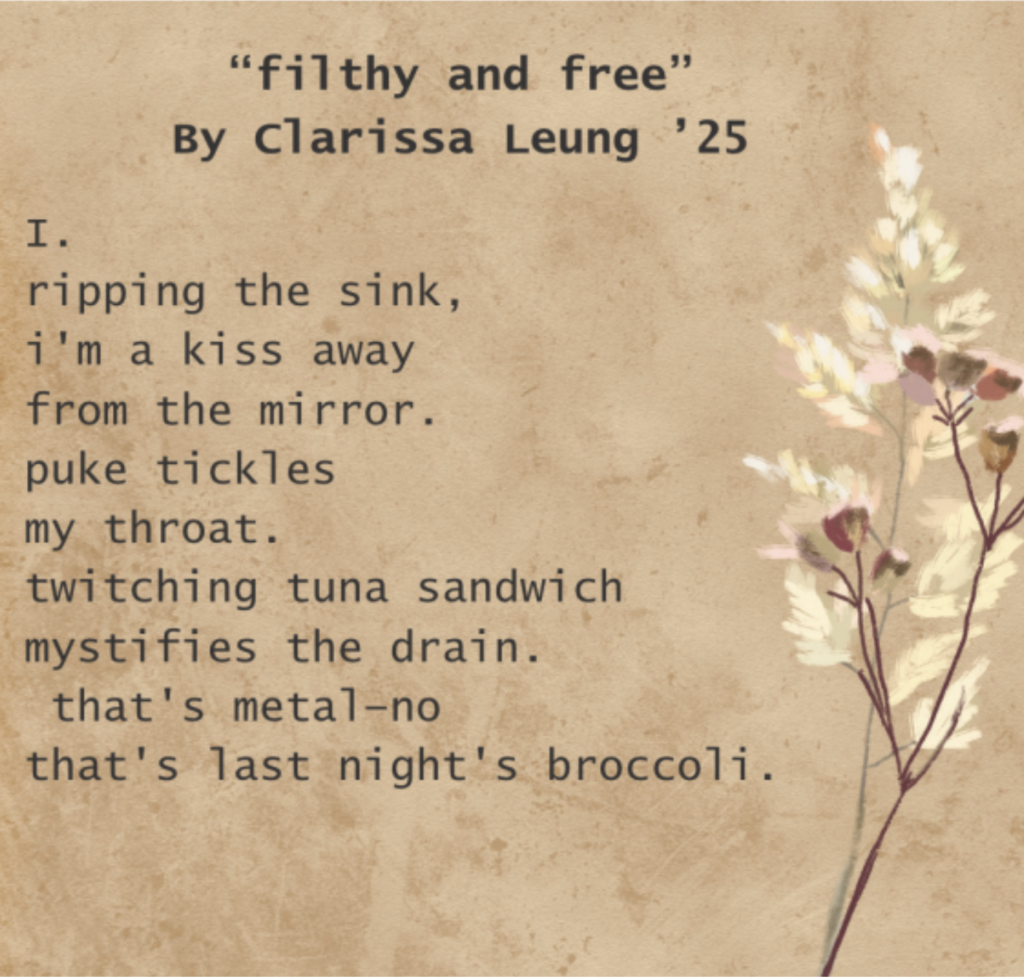Karthik Ramakrishnan ’27
Isabella Winner ’28
At The Episcopal Academy, students have ample opportunities to explore poetry in a variety of settings. Creative Writing Club, Open Mic events, and classroom assignments offer spaces for students to share their work and refine their craft. Julia Workman, Upper School English teacher, encourages students to experiment with poetic styles in a supportive environment. “It’s always fun to have students imitate poems and try writing in a similar style,” she says. “I give them a poem to study, and they take that style and apply it to something they want to write about. It’s a great way to learn the mechanics of poetry while still writing about topics that matter to them.”
Poetry stands apart as one of the most unique forms of writing, offering a space where ideas and emotions can be expressed without the constraints of plot or storylines. For many writers, the beauty of poetry lies in its ability to distill complex thoughts into a few carefully chosen words, often leaving readers to uncover layers of meaning through interpretation.

Photo courtesy of Clarissa Leung ’25
Christopher McCreary, Upper School Teacher and faculty advisor to the Creative Writing Club, shares his deep appreciation for poetry’s compact nature. “I’m most drawn to short poems, like one page or under,” he says. “It’s a satisfying amount of space to experiment with language. In a short story, you’re concerned with plot and character, but in poetry, you get to play with language itself without worrying about all those mechanics.” For McCreary, poetry offers the freedom to explore and shape language, an experience that isn’t always possible in longer forms of writing.
This emphasis on the power of language is echoed by Workman, who adds, “Poetry is compact, and there’s so much you can analyze in just a few lines. Every word matters, and that’s what makes it so exciting. It challenges you to find meaning in every detail.”
But poetry does more than just engage the mind—it serves as a tool for self-reflection and understanding. As a poet himself, McCreary explains, “For me, poetry is a way to understand the world. It’s my brain processing things—whether it’s a TV show, a conversation I overheard, or something I see outside. Poetry lets me turn those fragmented thoughts into something meaningful.” Through poetry, McCreary crafts a collage of his experiences and thoughts, a sentiment shared by Elizabeth Bishop in The Art of Losing, one of Workman’s favorite works. Bishop uses metaphors to guide readers through her exploration of loss, allowing them to draw their own interpretations, much like the personal and layered approach McCreary takes in his own writing.
At EA, poetry is not confined to English class alone; students can explore creative writing in various disciplines, including Biblical Literature, where they receive guidance and support from teachers like Father Gavin. For students like Clarissa Leung ’25, the journey into poetry begins with a spark of inspiration. “I first got interested in poetry in Father Gavin’s Biblical Literature class,” she recalls. “He encouraged me to keep writing and helped me refine my work, teaching me how to analyze my poems line by line.”
Upper School English teacher Anthony Herman has a vision for the future: a dedicated poetry workshop course, for those students who are passionate about poetry. “I think if we had a course where we read poems almost daily and had poetry assignments for homework, students would become so dedicated to it,” Herman explains. “It would help them develop their own voice and give them the tools to improve their poetry.” This kind of course would allow students to experiment with poetic forms and styles, receive feedback, and ultimately build confidence in their ability to communicate complex emotions and ideas through verse.As more students discover their passion for poetry, they gain access to a community of teachers and peers who are committed to fostering growth and experimentation in writing. With these opportunities, students are empowered to find their voice and express themselves in meaningful ways. McCreary concludes that poetry highlights, “How difficult it is to actually communicate with other people, and how rarely people hear each other clearly, and how language is part of that, how we miscommunicate, even when we don’t mean to; that’s the thing that comes back over and over again. So you’ve been writing since you were in high school.” Poetry helps people to truly understand each other, and that’s why it’s so prevalent in today’s world of hate and injustice.